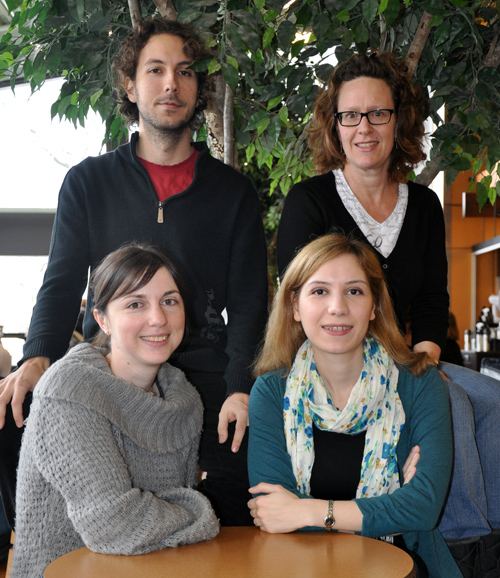
What do you get when PhD students in ecology and management work together to tackle a complex issue like food sustainability? An interdisciplinary collaboration that brings new perspectives to old problems.
“You can’t have interdisciplinary work if you don’t have people who share a set of common values,” says Rita Hansen Sterne, a PhD student in management and lead author of “Paradox and Dialogue: Ecology, Management and Food Sustainability.” She co-wrote the presentation with Anahita Khazaei, also a PhD student in management, and Collette Ward and Eric Harvey, both PhD students in ecology. They presented their findings in June at the Agriculture, Food and Human Values Society Conference in Michigan.
Explaining the title of their paper, Hansen Sterne says, “Paradox is not just about solving problems. It’s about getting groups that are disparate in their interests to work together.” Food sustainability is one example of an issue that brings people together with strong and, often opposing, viewpoints.
The management and ecology students soon realized they had more in common than they previously thought. “What was interesting, I think, for the ecologists was that they didn’t realize that the management literature wasn’t just about the corporate regime,” says Hansen Sterne. “They discovered that management literature is, in fact, about any organization or group and how they achieve their goals.”
Although they came from different academic backgrounds, the students used similar terminology, but in different contexts. Competition, for example, is a term used in ecology when referring to resources such as food, water and habitat. In business, it’s used in reference to consumers. “How competition is dealt with is quite different,” says Hansen Sterne. “In nature, we accept that there’s going to be death. We don’t – hopefully – see death in industry, but we know that there are deaths of companies.”
Resilience is another term that both ecologists and managers use differently, she adds. In ecology, resilience refers to adaptation or evolution, whereas in management, resilience means bouncing back from adversity.
The students also had different approaches to doing research, but combining their research methods led to a new appreciation of their strengths. “We all feel that what we’ve learned will help us approach any interdisciplinary work in the future,” says Hansen Sterne.
Universities are often blamed for being “silos” where knowledge stays within the lab or office in which it was generated, she adds. Collaboration between disciplines can help break down those walls so that information can flow more freely and questions can be answered more efficiently.
“We all felt so strongly about the fact that the problems of the world are too big to be set in the silo,” she says, adding that the group was united by its belief in collaboration as a means of addressing these problems. She says working with PhD students in other disciplines enhanced her own experience as a PhD student, and she encourages others to do the same.
This isn’t the first time Hansen Sterne has worked on a food-related research project as part of her PhD. Her thesis is looking at marketing-related capabilities of meat processing firms in Ontario that operate in supply-managed environments.
Her interest in sustainable food production also extends into other parts of her life. About 15 years ago, she became involved in community shared agriculture (CSA). At the beginning of each growing season, she pays a lump sum to a farmer and receives a share of the crop. “It’s the idea of giving fair return to that farmer for their work,” she says. “Part of the CSA model is that people will engage with agriculture and understand more about the food, where it comes from and how it’s produced.”